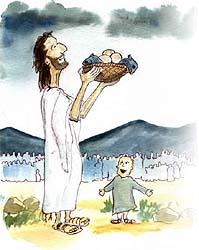
|
Podcast

|
Maturity
Encouragement
Good News
Church
Communion
Prayer
Christian Symbols
Scholarly Articles
Miscellany

|
Easter
Thanksgiving
Pentecost
Stations of the Cross

|
New Testament
Gospels
Acts
Paul's Letters
General Letters
Revelation
Topical Studies

|
Bible Studies
Articles
Books
Podcasts
Search
Menu
Donate
About Us
FAQ
Contact Us
Site Map
Don't Ask the Blessing, Offer One
by Dr. Ralph F. Wilson
 Jesus offering a blessing at the feeding of the 5000, © by Henry Martin, used by permission. Larger image. |
In your mind's eye I want you to picture Jesus at the Feeding of the Five Thousand. Hungry multitudes cover the hillside. Jesus takes the little boy's lunch, lifts it up, and says the familiar prayer: "Bless this food to the nourishing and strengthening of our bodies. Amen." I'm here to tell you that it just didn't happen like that. No way!
Since when did we begin to bless our food, anyway? Frankly, our food's been blessed to the point that most of us — how shall I say this — are "overnourished."
You find two words in the New Testament used in connection with praying before meals.
Offering Praise
Here's what really happened at the Feeding of the Five Thousand. "Taking the five loaves and the two fish and looking up to heaven, he gave thanks and broke the loaves" (Mark 6:41). The Greek word for "gave thanks" (NIV) or "blessed" (KJV) is "eulogeo," from which we get our English word "eulogy." It means "speak well of, praise, extol." The word commonly translates the Hebrew word, "barak," "to bless." But it wasn't the food Jesus was "speaking well of" or "blessing," it was his Father.
Every faithful Jew would offer this blessing before partaking of bread: "Blessed are you, Lord our God, King of the world, who has caused bread to come forth out of the earth." Before partaking of wine, the blessing was said this way: "Blessed are you, Lord our God, King of the world, who has created the fruit of the vine." The first word, "eulogeo," reminds us to eulogize or praise God before we eat.
Offering Thanks
The second praying-before-meals word is the Greek word "eucharisteo," from which we get our English word "Eucharist," often used as the name of Holy Communion. "Eucharisteo" means, "be thankful, offer thanks," and was used at the Last Supper.
"While they were eating, Jesus took bread, gave thanks (eulogeo) and broke it, and gave it to his disciples, saying, 'Take and eat; this is my body.' Then he took the cup, gave thanks (eucharisteo) and offered it to them, saying, 'Drink from it, all of you' " (Matthew 26:26-27, NIV).
What Jesus was doing at this Passover meal was offering to his Father the traditional blessings when bread and wine were eaten. It was common for Jews to offer a blessing for each food served during a meal.
The Bless Me Club
So how did we Christians end up blessing the food instead of God? Tradition? Habit? Some of the confusion may have come from a mistranslation of the passage I just quoted. In the King James Version, Matthew 26:26 reads: "And as they were eating, Jesus took bread, and blessed it, and brake it, and gave it to the disciples, and said, 'Take, eat; this is my body.' " Notice how the tiny word "it" was added after the word "blessed"? The word "it" isn't part of the Greek text — that's why it's in italics in the King James Version. But "bless it" implies something far different than "bless God." That addition of one little word may have twisted the way we pray before meals into something Jesus didn't intend at all.
Not that there's anything wrong in asking a blessing from God. There's not. Jesus taught us to pray, "Give us this day our daily bread" — but only after praise: "Our Father, which art in heaven, hallowed be thy name. Thy kingdom come, thy will be done...." No, asking favors from God isn't wrong, but it shouldn't be the primary part of our prayers, or we become like greedy little children: "Gimme this! Gimme that!". Those prayers are essentially selfish rather than self-giving. They don't fulfill either the First Commandment, to love God with all our heart, or the Second, to love our neighbor as ourselves.
How Should We Pray?
The Apostle Paul put it in this perspective. "Do not be anxious about anything, but in everything, by prayer and petition, with thanksgiving, present your requests to God" (Philippians 4:6). Notice the phrase "with thanksgiving" tucked in there with "present your requests to God." It's essential to keep prayer God-centered rather than self-centered. It's also the key to praying with real faith.
So when you pray, remember that your food doesn't deserve a blessing nearly so much as God who gave it. You can bless like Jesus did, "Blessed are you, Lord our God, King of the world, who has caused bread to come forth out of the earth." Or offer a simple prayer of thanks to God for the food. Next time, don't "ask the blessing," but offer one to your Father.
Copyright © 2026, Ralph F. Wilson. <pastor![]() joyfulheart.com> All rights reserved. A single copy of this article is free. Do not put this on a website. See legal, copyright, and reprint information.
joyfulheart.com> All rights reserved. A single copy of this article is free. Do not put this on a website. See legal, copyright, and reprint information.


 To be notified about future articles, stories, and Bible studies, why don't you subscribe to our free newsletter, The Joyful Heart, by placing your e-mail address in the box below. We respect your
To be notified about future articles, stories, and Bible studies, why don't you subscribe to our free newsletter, The Joyful Heart, by placing your e-mail address in the box below. We respect your